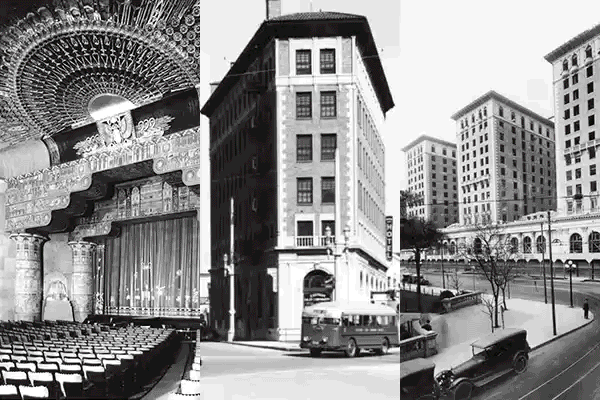Flashback to 1932, When the Entertainment Was Grand
- Share via
For a couple of hours last week my wife and I were back in 1932. We saw the 1931 movie “Grand Hotel” in the gilded extravagance of the downtown Los Angeles Theater, which was built in 1931.
I’m not sure I didn’t see the film for the first time in that same theater, since in that year I lived a mile west of Broadway, and frequently attended its numerous movie palaces.
The Los Angeles Theater is still breathtaking. You are inclined to laugh at the overkill as you enter its opulent interior. The effect is overwhelming. Two flights down from its gilded lobby you enter the large oval ballroom, flanked by what must be the most luxurious women’s room ever built. Each of its numerous stalls is finished in a different color of marble.
The Los Angeles was built in the early, stark years of the Depression. Its purpose obviously was to provide a temporary make-believe palace for those to whom the Depression had brought hard times. On its glittering opening night a bread line was visible across the street.
Thanks to the Los Angeles Conservancy and the Los Angeles Historic Theater Foundation, the Broadway theater palaces have been saved at least temporarily from destruction.
By a happy coincidence, just a few nights earlier we had seen the hit musical “Grand Hotel” at the equally opulent and historic Pantages Theater on Hollywood Boulevard. It, too, reflects the fantasy world created for moviegoers in the 1930s, and is an ideal setting for the musical stage version of that schmaltzy old movie.
That Vicki Baum’s bestseller novel, though scorned by critics, had some imperishable ingredients is shown by the durability of the movie and the vitality that remains in the musical version.
The movie is full of stars. Greta Garbo as the aging ballerina, transformed by an hour of love with John Barrymore as the compassionate jewel thief; Wallace Beery as the greedy business magnate; Joan Crawford as Flaemmchen, his designing typist; Lionel Barrymore as the victimized accountant; Lewis Stone as the cynical observer. (“Grand Hotel. People come, people go. Nothing ever happens.”)
In her short time on screen Garbo reminds us why she mesmerized audiences in her day. She translates love into the most contagious body language. In her furs she walks through the lobby like a love-struck leopard. John Barrymore, the baron, is seen almost entirely in profile, an exploitation of his most impressive aspect.
Crawford exudes vulnerable sexuality. Beery is gross, possessive; a swine. The elder Barrymore elicits sympathy as the nobody who has never lived, and now must die.
It is fascinating how much of this old movie has been kept in the musical. As Grushinskaya, the ballerina, Liliane Montevecchi brings balletic grace to the role, and adds much sly humor. One must believe, of course, that she, like Garbo, can fall instantly in love.
As the baron, Brent Barrett is as charming, dashing and romantic as Barrymore, although for some reason he is shot, rather than bludgeoned, as he is in the movie.
Being a musical, the Pantages version naturally adds music and dancing, most of which is that theme song of the day, “The Charleston.” As a man who has always been delighted by the Charleston, I almost got my fill of it in the musical. The telephone operators, the maids and other minor members of the cast do a nonstop Charleston as a backdrop for the main action in one scene.
DeLee Lively, who plays Flaemmchen, does a Charleston that is both hilarious and scandalous. Her back to the audience, she swings, thrusts and bumps her bottom in a way that defies the nature of anatomy as well as social conventions.
It is curious that in the movie Joan Crawford does nothing but a discreet turn on the dance floor with the bumbling Lionel Barrymore. Only a couple of years earlier she had literally danced her way into stardom by doing the Charleston in her teddy in “Our Dancing Daughters.” Strangely this talent was not exploited in the movie “Grand Hotel,” but DeLee Lively exploits it to the limit in the musical.
It is interesting that at least two movie sequels were made of “Grand Hotel” (“Hotel Berlin,” “Weekend at the Waldorf”) but they have vanished without a trace.
Perhaps the making of “Grand Hotel” into a musical is a trend. Usually, the opposite sequence is followed. “Oklahoma,” “The Music Man” and “My Fair Lady” (adapted from George Bernard Shaw’s “Pygmalion”) to mention only three of many, were made into movies from successful stage musicals.
How about “Casablanca” as a musical? Can’t you imagine Ricks’ patrons singing “La Marseillaise” and drowning out the Germans?
Great way to end Act One.
More to Read
Only good movies
Get the Indie Focus newsletter, Mark Olsen's weekly guide to the world of cinema.
You may occasionally receive promotional content from the Los Angeles Times.









